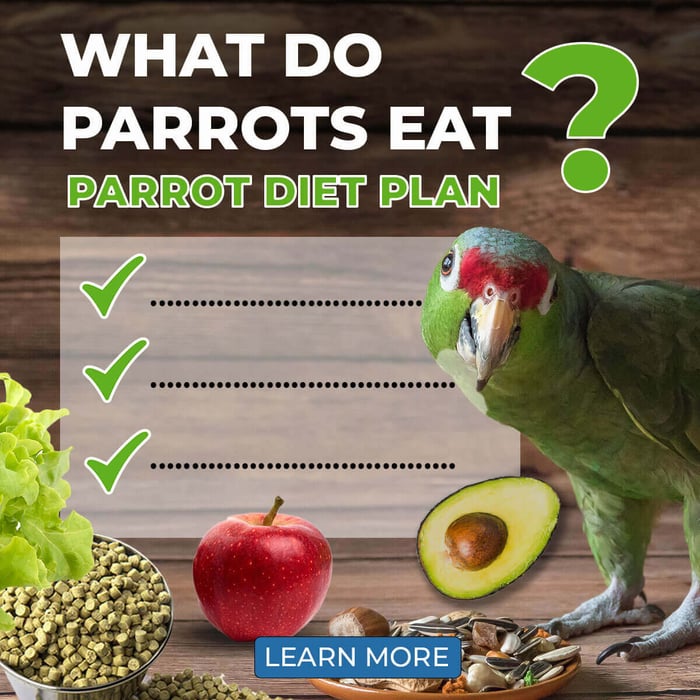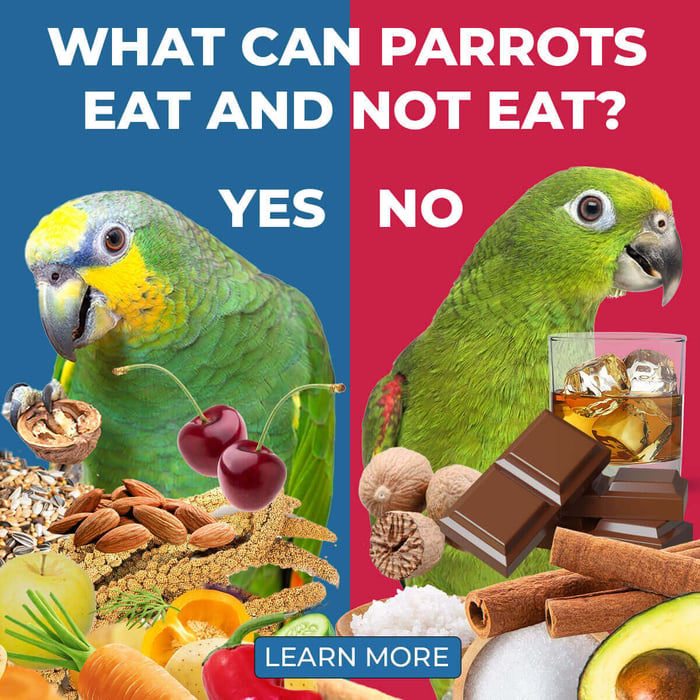10 Parrot Facts to Consider if You Want a Pet Parrot
Why should you consider these parrot facts If you’re interested in keeping a parrot as a pet? Parrots are amazing creatures and loving pets. However, there are some parrot facts to consider before you add one to your family. They are often considered "easy pets", which commonly leads to them being abandoned once the owner realizes things are a bit more complicated than they thought.
We’ve rounded up 10 important parrot facts that you should take into consideration before buying one of these colourful birds.

1. Parrot lifespan is very long
And by long, we mean, like, seriously long. Even the tiny budgerigar, the most commonly kept pet parrot species, can easily live for over 10 years if cared for correctly.
Once we get into the bigger species, it’s not uncommon to see parrots with lifespans of 30 years and up. Where will you be in 30 years? It’s obviously impossible to predict the way life will unfold, but you should at least make sure you’re willing to commit for one or multiple decades.
Parrot facts: Cookie, a Major Mitchell’s cockatoo (Cacatua leadbeateri), was the oldest parrot ever, at least 82 years and 88 days old, when he passed away on 27 August 2016.
2. What if you have to go away?
What will you do if you’d like to take a holiday or have a family emergency? A parrot is not like a fish that can be left to its own devices with someone coming in once a day to feed it.
A day or two might be okay, especially if you have more than one bird, and they can keep each other company, but you really need a plan in place if you plan on being out longer.
Be sure to discuss this with potential pet-sitters before you go out and buy a parrot. If no one is willing to watch your parrot, check out potential pet hotels to see how you feel about them.
3. Parrots can be very loud
Parrots in the wild live in large flocks that roam treetops and fly around together. If part of your flock is in a different tree, how do you make sure they’re still safe and nearby? You have to scream pretty loudly for them to hear you.
Sound is a parrot’s main way of expressing itself. It’s one of the less-known parrot facts that even species labelled as ‘quiet parrots’ can still be expected to emit flock calls or whistle throughout parts of the day. Placing the bird away from you, like in a spare bedroom, is not going to help curb this. If anything, the bird will likely become even louder while trying to locate flock mates to relieve its loneliness.
If you’re sensitive to noise, a parrot is unfortunately not the right pet for you.
Even cockatiels, which are generally considered quiet and relaxed parrots, will frequently make noise.
4. All parrots need a large cage
Yes, even small ones and ones that spend daily time out of their cages. They all need room to stretch their wings, explore and climb around.
It’s one of the most important parrot facts: bigger is pretty much always better when it comes to cages. As such, you’ll have to consider whether you have space for a large cage in your home!

5. Medical care
No one wants to think about their pet getting sick, but it’s important to have a plan in place. If you want to keep a parrot as a pet, you’ll have to keep in mind that not all vets are skilled in treating birds or even willing to do so.
Before getting your parrot, check out avian vets in your area. And don’t forget to put some funds aside for emergencies! Vet bills can be very steep, so it’s a good idea to be prepared. After all, the last thing you need when your parrot is ill is having to worry about finding an Avian Vet or their bill.
You may want to consider Parrot Insurance. This will give you peace of mind and you don’t have to stress about the expenses associated with treatments.
6. Can you deal with the mess?
Do you think cats and dogs are messy? Think again! Parrots don’t just strew feathers all over the place. They also have an inherent love for flinging food around and chewing objects into tiny confetti bits. Oh, and many of them poop about every 15 minutes.
As you can imagine, a parrot cage needs very regular cleaning. Paper at the bottom will usually have to be replaced daily, while a more thorough clean is in order at least every week.
It’s not just the cage either: no matter how many precautions you take, parrots almost always manage to get the floor around their enclosure dirty. The author keeps two budgies and even these small birds warrant a daily vacuum session around the cage!
Parrot fact: As tempting as it is, you can’t use strong cleaning agents to remove parrot messes. The chemicals can damage their lungs! You’ll have to rely on good old water and vinegar or a parrot-proof solution like Poop-Off.

7. Are you able to provide daily attention?
Some people consider getting a parrot as a pet because they feel that a dog or cat would get too lonely when they’re at work. Unfortunately, parrots are not the solution to this problem. They’re extremely social beings that need loads of attention from their flock (that’s you!) to thrive.
If you do have a job that requires you to be away from home for 8 hours a day, you’re likely best off keeping more than one parrot. Even then, it’s incredibly important to take your feathered friends out of their cage when you’re home and spend time with them.
Do daily training, talk and give head scratches or even just let your bird sit with you while you watch some TV. To use the author’s budgies as an example again, cleaning, training, chatting, and sitting together take up about 1.5 hours each day.
8. Do you have health issues?
It’s not one of the more commonly considered parrot facts, but these birds can exacerbate or even cause health issues for some people. Before getting a parrot as a pet, consider the following:
- Do you have asthma or other lung issues? Some birds, like cockatiels, cockatoos and African Grey parrots, produce dander that can worsen these conditions. Even danderless birds are hard on the lungs. There’s actually a name for it: budgerigar fancier’s lung.
- Do you have allergies? It might be a good idea to spend some time with someone else’s parrot just to make sure you’re not overly sensitive to them.
- How is your mental health? A pet can help tremendously if you suffer from depression or anxiety, but it can also make things worse. Are you mentally able to deal with the responsibility, cleaning and noise?
9. Parrots are expensive pets!
Take a good look at your financial situation before getting a parrot. Many potential pet owners overlook the fact that there’s more to having an animal than the initial cost.
Parrots can be expensive to buy and the same goes for their cages. But it goes beyond that: we already mentioned vet bills under one of the previous parrot facts on the list (#5). There are also the costs of regularly replacing chewed-up toys, food and other accessories like perches.
Small parrots like budgies are generally cheaper than large species since they are not as destructive and simply eat less. Still, if your financial situation is unstable, you might want to hold off on adding a parrot to your family for now.
All of these 10 points apply to small parrots like budgies just as much as they do to larger species. Their size and low purchase price tend to make people think of them as "disposable", but they’re equally intelligent and worthy.

10. Behavioural "problems"
It’s all fun and games until your parrot starts biting, screaming or refusing to do anything you want it to do.
If there’s one thing we’ve learned here at Parrot Essentials, it’s that parrots don’t have behavioural problems: people just don’t always understand them. Parrots are unequivocally themselves. The issue is that this doesn’t always match what we want from them.
Before you add a parrot to your family, consider whether you would be willing to work with it if things don’t exactly go as you planned. Can you maintain your patience after getting chomped in the finger for the 10th time today?
Most importantly, are you willing to do research, spend lots of time training and adjust your own behaviour so that your parrot feels comfortable and happy? If the answer is no, you’ll have to reconsider.




